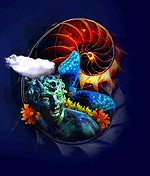|
|
blue crow
Michael Spring
Lit Pot Press (2003)
86 pages
ISBN number: 0-9722793-6-9
Reviewer: Terri Brown-Davidson
There's a Zen consciousness that pervades Michael Spring's poetry collection blue crow, a meditative stillness that cracks itself open and reveals itself as a series of internal dialogues throughout the four sections of the book: dialogues between self and self, self and lover, self and the world. In this unassuming quiet, there's a host of poetic effects so artfully disguised that the reader might forget that she's reading poetry. Yet, if Spring's isn't a poetry of virtuosity or bombast or ballast, it is work capable of vaulting the reader up to a new consciousness of the self as a whole: intact, restored, and--as old-fashioned as it sounds--beautiful.
In this final word might be located the raison d'etre for our celebration of Spring's work. For he can reveal the extraordinary in the "ordinary" with the strongest of the conversational poets, yet there's a music in Spring's work that's often lacking in Ted Kooser's or--to seek a more distant antecedent--Richard Hugo's. All of the adjectives (including "beautiful") that we might use to describe Spring's work are strangely old-fashioned. And yet, it's perhaps we--and not Spring's poetry--that are anachronistic for allowing these words to slip so subtly out of usage and, finally, consciousness: "integrity," "substance," "soulfulness."
For Spring's poetry is no amalgamation of fluff and effects, of sharp-tongued witticism and fashionably throw-away lines. Nor is it work guaranteed to probe and scour the darkest and rankest-tasting reaches of a confessionalism that celebrates, in occasionally strained though often powerful ways, the grit and effluvia of a mind yoked, conjoined twin-like to a body. This is poetry so near-silent that it has to whisper in one's ear for minutes before one attends to the deft though subdued lyricism that sings of ordinary subjects, yet in such astonishingly original ways that one is forced, finally, to listen, as in "cockroaches":
I'm calling them out
from their empty
can homes from
under-floor tunnels
and gutted computer shells
here's the dilapidated
landscape of mushroom pizza
I'll leave hanging
from the chandelier -- I must
continue to challenge
and to keep them
thinking and strong
when this house is
reduced to a single
porch overlooking the abyss
and the cockroaches
must crawl and scurry over
burnt hair and mildewed
clothes I'll be happy
to have been
part of increasing their chances
happy to know
that something from this house
will bleed
into the next world
Though each line of poetry might not be great or balanced in itself, the cumulative effect is fantastic. This is poetry that's guaranteed not to desert you in the darkest hours of the night, so haunting is it--and it's poetry that's guaranteed, depending upon the individual piece, to wake the reader either sweat-soaked or intensely comforted. Odd as it sounds, I found comfort in the permanence of the vermin Spring so lovingly evokes. Spring's cockroaches are the response to Gregor Samsa's call, offering us the knowledge that even the lowliest among us can leave an imprint upon this world, and, by doing so, inevitably shadow the next.
However, Spring's poems are just as likely to leave the reader sweat-soaked as comforted. In this respect, their looming silences can become veritable shouts of societal or existential discomfort. This poem, "what kind of fish can survive this river," with its carefully grotesque mingling of war and ecological and relationship themes, disturbed me--wonderfully!--for days:
that night you told me
you were going to fight in the war
we sat on boulders
overlooking the muddy banks
of the Sacramento River.
our shoes were battered with muck.
the smell of rotting fish
and mildewed rags
settled into itself.
a street lamp's light
on the other side of the river
floated like a barge
on the slow surface.
and for a moment I thought
of you as a ghost --
your spine snapped
from some spinning wing of metal --
how a snake slid into your chest
then combusted --
how your voice rose out with green smoke.
I didn't know what to say
so I brought up old school stories.
frogs and crickets began
to stir the dark --
the river moved like a beggar
in a heavy coat.
we joked about what kind of fish
could survive this river --
we dreamed up a creature
flat and lumpy
that must convulse to move -- its eyes
on the back of its head --
no teeth, no bones -
with a mouth on its belly
it sucks contaminated sludge.
this made us laugh. we fell
into each other's arms
and hugged for the only time
like brothers --
all night I feared
I wouldn't remember your voice --
all night I lay in bed and heard
the hiss of cars on asphalt
as planes in the sky
Spring's blue crow is so beautiful that it would be a mistake to miss it. More importantly, though, in an age of essentially insubstantial poetry, Spring's work nourishes the soul.
|
|


